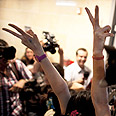
During my first year at the Hebrew University I worked at a typical Jerusalem bar – coffee and pastry in the morning, hamburgers for lunch and plenty of beer in the evening. The bar's proximity to Jerusalem's city center made it popular with the foreign peace activists who arrive in Jerusalem quite often. On numerous occasions I spoke to those who grabbed a drink after another day of protesting in Sheikh Jarrah or Bi'lin. Time after time I found myself wondering – why do they even bother coming here? How can a 20 year old Danish boy wake up one morning and tell his parents he's flying to the Middle East?
A foreign reporter from Spain, who loves Israeli red wine, told me once how every foreign correspondent dreams of being stationed in Israel. "This is a foreign correspondent's paradise!" she said. "Where else can you go to restaurant in a city such as Tel Aviv, grab a drink, or go dancing on Dizengoff Street, and sleep at a fancy hotel, when the only thing that separates you from your authentic 'battle field' report is a 45 minute drive into Jerusalem or Bil'in and Naalin?
Indeed, Israel holds a strange dissonance that we have developed throughout our years of living by the sword. The south is bombed, one million citizens sit in bomb shelters, but 15-20 kilometers away – everything is just the same. We have created a situation where little Israel consists of two parallel universes. The foreign activists fit perfectly into one and only one of those universes – the good, comfortable and quiet one.
The second reason was explained to me by two Swedish activists who loved the mixture of Arak and fresh grapefruit juice in their cocktails. I asked them once this one clichéd question that always comes to mind – "So why Israel of all places? Why not Syria? Egypt? Russia or China?" One of them put on a serious face. "Are you insane?" he asked me. "These are all extremely dangerous places!"
And that's when it hit me.
These people know that nothing bad is going to happen to them here. The massive exposure of the high-ranked Israeli officer who struck a protestor, and the amount of condemnation it received, proves how unusual this incident was. When the worst thing that could happen to you is to get smacked on the face and become a war hero among your friends – why wouldn't you hold up a sign? Why wouldn't you throw a stone at a soldier or a police officer?
This is just a game
After all, in Egypt or Syria you would become another dead body on the street. In China or Russia you would find yourself imprisoned for the rest of your life if you even attempted to raise your hand against a local police officer or soldier."So wait," I asked in all seriousness. "You wouldn't have come here if you thought you could get badly hurt?" My Swedish friend grinned. "I don't think so," he said. "I may be a radical, but I'm also a spoiled one!" And they both burst out laughing.
That's when I realized that for many of those foreign peace activists, this is all just a game. And in this game we, the Israelis and Palestinians, are the pieces. They come from all corners of the world to a faraway country they have never been to before. They confront soldiers and policemen, blocking roads and holding signs. Moreover – as long as they have their cold beer by the end of the evening, as long as they lay their heads in a comfy and friendly hostel – they will continue to arrive.
They take advantage of what we're most proud of: Our freedom, democracy and the tolerance that we're so afraid to lose. They take advantage of the strange system we have developed, the one that lets us disconnect ourselves from reality and continue with our lives even when real fighting takes place so close to us.
I hope that once they are here, beyond the screens of blind hatred, they will be able to find the light in the existence of Israel. I hope they will embrace how lucky they are to be “spoiled radicals” here with us. Then they might take a step back and scale back the “Palestine will be free from the River to the Sea" calls a bit. Hopefully they will realize that if that actually happened, and Israel disappeared, they will not have anywhere else to go.
Tal Dror is a second-year student in international relations and Mideastern Studies at Hebrew University of Jerusalem















